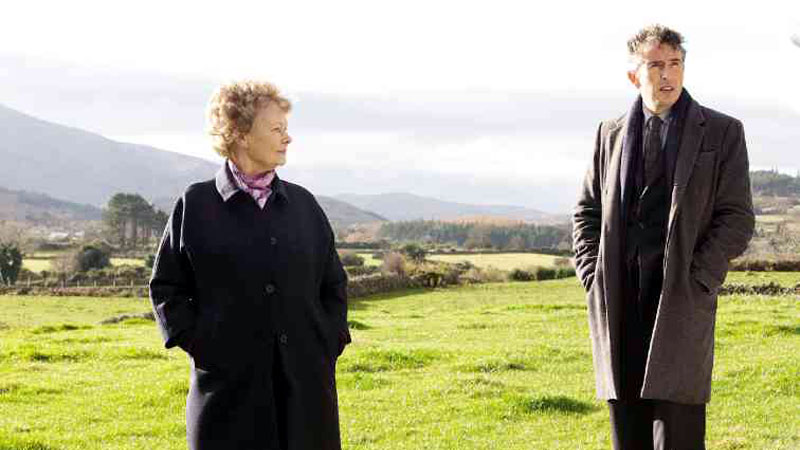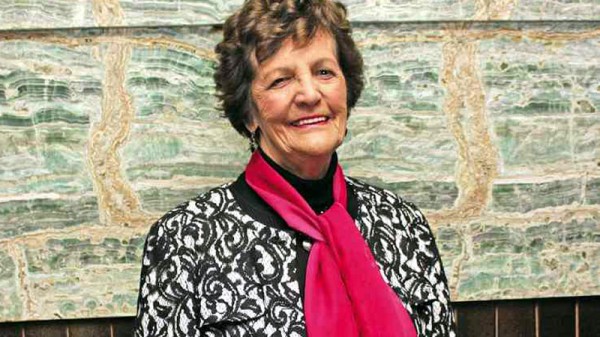Meet the real Philomena
LOS ANGELES—Talking to the real-life Philomena Lee, played by Judi Dench in “Philomena” in a performance that earned her Oscar and Golden Globe Best Actress nominations, was as moving and inspiring as the film itself. Philomena, a lovely woman at 80, was sweet and gracious throughout our interview in London, bearing no bitterness despite the heartache and struggles she went through.
For 50 years, Philomena kept secret that she had a son. As a teenager in 1952, she gave birth out of wedlock to Anthony in a convent home in Ireland, where her family had “put her away.” For three and a half years, she worked in the laundry and saw Anthony for just an hour each day. One day, an American woman came to adopt a girl, but also adopted Anthony on the spot, and took both kids back to the United States. Philomena was distraught. Fearing damnation (a nun had warned her not to reveal her secret), she kept mum for half a century.
When Philomena finally opened up to her daughter, Jane, it led to a series of events that resulted in Martin Sixsmith, a former BBC correspondent, helping mother and
daughter search for Anthony. It turned out that he had been renamed Michael Hess.
Michael became chief legal counsel at the White House when George H. W. Bush was president. A gay man, Michael himself had gone back to the convent in Ireland several times to find his mother but the nuns did not help. In 1993, Michael, infected with HIV in the late 1980s, was terminally ill. He begged the nuns to let him be buried in the convent when he died, hoping that his mother would somehow find him there.
The film, directed by Stephen Frears from Steve Coogan and Jeff Pope’s brilliant adaptation of Martin’s book, “The Lost Child of Philomena Lee,” is an illuminating piece on faith (or lack of it) as Judi’s Philomena and Steve, who plays Martin, a lapsed Catholic, engage in conversations in the film. “Philomena” has been bashed by some as another anti-Catholic movie. On the contrary, it presents a balanced view. In fact, the film, seen from Philomena’s perspective, is an affirmation of faith, with all its seeming contradictions.
It was a difficult decision to reveal your story. Why did you decide to finally open up?
I never told anybody for 50 years. In those days, when you had a baby [out of wedlock], it was very shameful. When I told my lovely daughter, she started looking for him. It has taken us 12 years to come to this stage. In the first 18 months, we tried adoption agencies in Ireland, America…but we could find no information. My daughter’s friend went to a party one night and met the chap (Martin Sixsmith) who would write the book. She said to him, “My friend has a very good story. Would you be interested?” He said, “No, I don’t do that sort of story.” He was a political journalist.
But he changed his mind later. He researched for the book for about six years. The beginning and end of the book are my story. But the middle, about my son—when he was adopted in America—I knew nothing about. Martin found out about Anthony’s life story. As you know, he was gay. Martin found Anthony’s partner in America. Martin got a lot of information from the partner.
Martin also found the little girl who was adopted with Anthony in 1955. Martin met up with her in Florida. She gave Martin a lot of information about Anthony. I knew he had gone to America because I had to sign him away when he was 3-1/2 years old.
My father wouldn’t have me home. My mother died when I was 6. When they discovered I was pregnant, I went to the convent at Roscrea in County Tipperary [where] I had Anthony and stayed for three and a half years. I did the laundry for the nuns, the children and ourselves. I had one hour a day to play with Anthony.
Then…Anthony was gone. They said that this lady [who] adopted him [had] a very nice family in America. She had three boys of her own, so she wanted a little girl. Anthony and this little girl were always playing together, and when the lady came to pick the little girl up, Anthony wouldn’t leave her side. So the lady phoned her husband in America. He said, “Well, bring him along.”
Judi Dench portrays you as very forgiving. How close to reality was that? Where does your sense of forgiveness come from?
When I left the convent, they got me a job in a boys’ school in Liverpool, England. I was sort of very bitter, because when they took him away, I was upset and heartbroken. I was a Catholic, and I did lose my religion because of that. But they had to get him adopted, because there was no way I could have taken him home anywhere in Ireland.
I stopped going to confession [and] communion but I never lost my faith. I always prayed for everybody and anybody, even the nuns. I stayed in the boys’ school for two years, then moved to where I am in England now. I became a nurse [and practiced] for 30 years—mostly psychiatric nursing. That’s when I began to mellow again, realizing that many people had worse problems than I ever had. I went back to my religion and there I have stayed.
Were you surprised about what Anthony had become?
Surprised that he ended up in the White House. Little ol’ me, having a son in the White House.
Any clue whether or not the nuns understood the harm they had done?
They actually thought they were doing me a favor. The only way he could get a decent home was by getting adopted.
Several times I tried to find Anthony and the nuns said, “You have signed him away.” Anthony came to Ireland several times looking for me. They sent him off, saying they didn’t know where I was, that I had abandoned him at birth. The awful part that I get upset about was that he died thinking I had in fact abandoned him at birth. And I didn’t, no way.
I had nobody to help me. I remember asking the nuns several times, when I was in the convent, if they could find me a job so I could take him with me. They said, “No, he’s got to be adopted.”
The last time Anthony went to the convent, he was ill, and still didn’t tell him…they could have found me because I kept in touch with them over the years. Every time I moved, I sent a letter, but I never got any answers from them. I thought maybe that was all for the best.
It was so hard, finding out that Anthony had looked for me. I never got to see him. And when he went with his partner to Ireland, Anthony said to him, “When I die, would you bury me here so that my mother could find me?”
Talk about Judi Dench playing you in a film.
Well, what more could a woman ask for? She’s a perfect lady and an absolute treasure. We got to know one another before she started shooting. She said she’s never played anybody who was still alive. But she put me at ease. She’s such a lovely, gentle lady. I couldn’t have asked for anybody better to take my part.
Has anything changed, so that people could find estranged sons or daughters in the system?
There’s a lot of issues going on in Ireland at the moment. They still won’t tell people. Moms have tried to find their families, but they don’t get any information. People are still searching.
I met some love sisters in the convent. But you weren’t allowed to take photographs with your baby. So you lost your identity. We got different names, too. I was called Marcella the whole time. You weren’t allowed to speak about your family.
Nothing has changed.
Having gone through all this, and with the book, did you get some sense of closure?
Yes. Most certainly. I “talk” to Anthony every day. I did all my life, really. I prayed and prayed that one day I would find him. I know somewhere up there, he has found me. In a way, he managed to get the book done and the film made. When Martin was out there finding information about him, I never thought he would write this book. I didn’t think it was enough of a story to fill up a book and end up as a movie.
But I’ve had closure and I often go back to Ireland, to his grave. Anthony’s partner brought back his ashes to Ireland the year after his death. I have photographs of him, too. His partner gave us a lot of details about him. He gave me Anthony’s Celtic ring and all sorts of things. I wear his ring all the time. Every time I look at it, I say a little prayer for him. I do believe that he instigated finding me.
Having survived pain, what do you think of the phrase, “Everything happens for a reason”?
Oh, I am a great believer in that. I always say that. Every single thing happens for a reason. We can’t see it, but your life has been [mapped out] for you, from the day you were born till the day you die.
(E-mail the columnist at rvnepales_5585@yahoo.com. Follow him at https://twitter.com/nepalesruben.)

